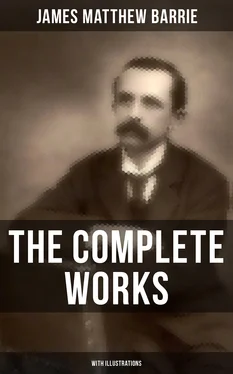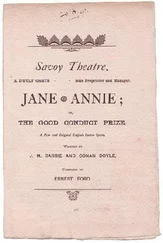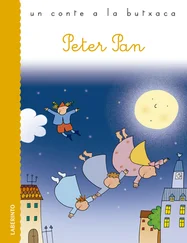About midnight Hendry climbed the attic stair and joined me at the window. His hand was shaking as he pulled back the blind. I began to realize that his heart could still overflow.
"She's waur," he whispered, like one who had lost his voice.
For a long time he sat silently, his hand on the blind. He was so different from the Hendry I had known, that I felt myself in the presence of a strange man. His eyes were glazed with staring at the turn of the brae where the doctor must first come into sight. His breathing became heavier, till it was a gasp. Then I put my hand on his shoulder, and he stared at me.
"Nine-and-thirty years come June," he said, speaking to himself.
For this length of time, I knew, he and Jess had been married. He repeated the words at intervals.
"I mind—" he began, and stopped. He was thinking of the spring-time of Jess's life.
The night ended as we watched; then came the terrible moment that precedes the day—the moment known to shuddering watchers by sick-beds, when a chill wind cuts through the house, and the world without seems cold in death. It is as if the heart of the earth did not mean to continue beating.
"This is a fearsome nicht," Hendry said, hoarsely.
He turned to grope his way to the stairs, but suddenly went down on his knees to pray.…
There was a quick step outside. I arose in time to see the doctor on the brae. He tried the latch, but Leeby was there to show him in. The door of the room closed on him.
From the top of the stair I could see into the dark passage, and make out Hendry shaking at the door. I could hear the doctor's voice, but not the words he said. There was a painful silence, and then Leeby laughed joyously.
"It's gone," cried Jess; "the white spot's gone! Ye juist touched it, an' it's gone! Tell Hendry."
But Hendry did not need to be told. As Jess spoke I heard him say, huskily: "Thank God!" and then he tottered back to the kitchen. When the doctor left, Hendry was still on Jess's armchair, trembling like a man with the palsy. Ten minutes afterwards I was preparing for bed, when he cried up the stair—
"Come awa' doon."
I joined the family party in the room: Hendry was sitting close to Jess.
"Let us read," he said, firmly, "in the fourteenth of John."
Chapter V.
A Humorist on His Calling
Table of Contents
After the eight o'clock bell had rung, Hendry occasionally crossed over to the farm of T'nowhead and sat on the pig-sty. If no one joined him he scratched the pig, and returned home gradually. Here what was almost a club held informal meetings, at which two or four, or even half a dozen assembled to debate, when there was any one to start them. The meetings were only memorable when Tammas Haggart was in fettle, to pronounce judgments in his well-known sarcastic way. Sometimes we had got off the pig-sty to separate before Tammas was properly yoked. There we might remain a long time, planted round him like trees, for he was a mesmerising talker.
There was a pail belonging to the pig-sty, which some one would turn bottom upwards and sit upon if the attendance was unusually numerous. Tammas liked, however, to put a foot on it now and again in the full swing of a harangue, and when he paused for a sarcasm I have seen the pail kicked toward him. He had the wave of the arm that is so convincing in argument, and such a natural way of asking questions, that an audience not used to public speaking might have thought he wanted them to reply. It is an undoubted fact, that when he went on the platform, at the time of the election, to heckle the Colonel, he paused in the middle of his questions to take a drink out of the tumbler of water which stood on the table. As soon as they saw what he was up to, the spectators raised a ringing cheer.
On concluding his perorations, Tammas sent his snuff-mull round, but we had our own way of passing him a vote of thanks. One of the company would express amazement at his gift of words, and the others would add, "Man, man," or "Ye cow, Tammas," or, "What a crittur ye are!" all which ejaculations meant the same thing. A new subject being thus ingeniously introduced, Tammas again put his foot on the pail.
"I tak no creedit," he said, modestly, on the evening, I remember, of Willie Pyatt's funeral, "in bein' able to speak wi' a sort o' faceelity on topics 'at I've made my ain."
"Ay," said T'nowhead, "but it's no the faceelity o' speakin' 'at taks me. There's Davit Lunan 'at can speak like as if he had learned it aff a paper, an' yet I canna thole 'im."
"Davit," said Hendry, "doesna speak in a wy 'at a body can follow 'im. He doesna gae even on. Jess says he's juist like a man ay at the cross-roads, an' no sure o' his wy. But the stock has words, an' no ilka body has that."
"If I was bidden to put Tammas's gift in a word," said T'nowhead, "I would say 'at he had a wy. That's what I would say."
"Weel, I suppose I have," Tammas admitted, "but, wy or no wy, I couldna put a point on my words if it wasna for my sense o' humour. Lads, humour's what gies the nip to speakin'."
"It's what maks ye a sarcesticist, Tammas," said Hendry; "but what I wonder at is yer sayin' the humorous things sae aisy like. Some says ye mak them up aforehand, but I ken that's no true."
"No only is't no true," said Tammas, "but it couldna be true. Them 'at says sic things, an', weel I ken you're meanin' Davit Lunan, hasna nae idea o' what humour is. It's a think 'at spouts oot o' its ain accord. Some of the maist humorous things I've ever said cam oot, as a body may say, by themsels."
"I suppose that's the case," said T'nowhead, "an' yet it maun be you 'at brings them up?"
"There's no nae doubt aboot its bein' the case," said Tammas, "for I've watched mysel often. There was a vara guid instance occurred sune after I married Easie. The Earl's son met me one day, aboot that time, i' the Tenements, and he didna ken 'at Chirsty was deid, an' I'd married again. 'Well, Haggart,' he says, in his frank wy, 'and how is your wife?' 'She's vara weel, sir,' I maks answer, 'but she's no the ane you mean.'"
"Na, he meant Chirsty," said Hendry.
"Is that a' the story?" asked T'nowhead.
Tammas had been looking at us queerly.
"There's no nane o' ye lauchin'," he said, "but I can assure ye the Earl's son gaed east the toon lauchin' like onything."
"But what was't he lauched at?"
"Ou," said Tammas, "a humorist doesna tell whaur the humour comes in."
"No, but when you said that, did you mean it to be humorous?"
"Am no sayin' I did, but as I've been tellin' ye, humour spouts oot by itsel."
"Ay, but do ye ken noo what the Earl's son gaed awa lauchin' at?"
Tammas hesitated.
"I dinna exactly see't," he confessed, "but that's no an oncommon thing. A humorist would often no ken 'at he was ane if it wasna by the wy he makes other fowk lauch. A body canna be expeckit baith to mak the joke an' to see't. Na, that would be doin' twa fowks' wark."
"Weel, that's reasonable enough, but I have often seen ye lauchin'," said Hendry, "lang afore other fowk lauched."
"Nae doubt," Tammas explained, "an' that's because humour has twa sides, juist like a penny piece. When I say a humorous thing mysel I'm dependent on other fowk to tak note o' the humour o't, bein' mysel ta'en up wi' the makkin' o't. Ay, but there's things I see an' hear 'at maks me lauch, an' that's the other side o' humour."
"I never heard it put sae plain afore," said T'nowhead, "an', sal, am no nane sure but what am a humorist too."
"Na, na, no you, T'nowhead," said Tammas, hotly.
"Weel," continued the farmer, "I never set up for bein' a humorist, but I can juist assure ye 'at I lauch at queer things too. No lang syne I woke up i' my bed lauchin' like onything, an' Lisbeth thocht I wasna weel. It was something I dreamed 'at made me lauch, I couldna think what it was, but I laughed richt. Was that no fell like a humorist?"
Читать дальше












